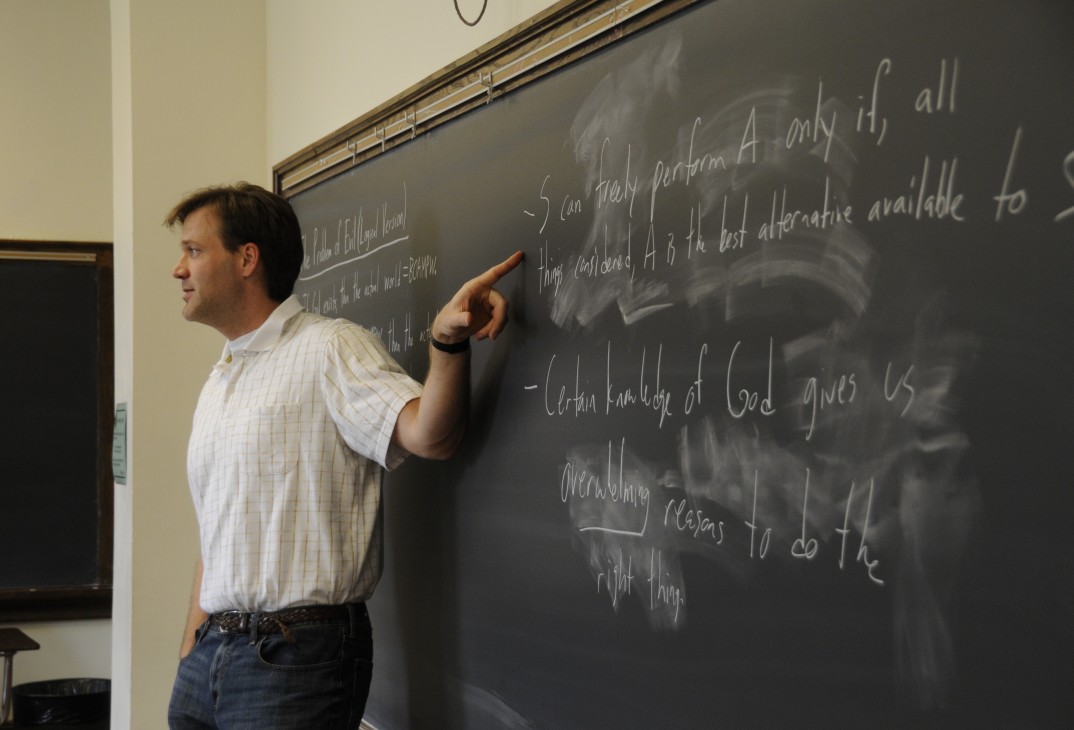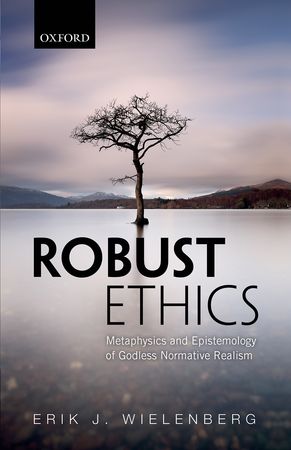Last week we published the abstract of Erik Wielenberg’s new book, Robust Ethics: The Metaphysics and Epistemology of Godless Normative Realism. In this guest post, Wielenberg, Professor of Philosophy at DePauw University, follows up with a more in-depth discussion of the book and some of the philosophers that have influenced his thinking on moral realism and God’s existence.
In 1977, two events that would significantly impact my life took place. First, the film Star Wars was released. Second, two prominent philosophers, J.L. Mackie and Gilbert Harman, unleashed some influential arguments against moral realism. My book is about the second of these two events.
In his famous argument from queerness, Mackie listed various respects in which objective values, if they existed, would be “queer.” Mackie took the apparent queerness of such values to be evidence against their existence. One feature of objective values that he found to be particularly queer was the alleged connection between a thing’s objective moral qualities and its natural features: “What is the connection between the natural fact that an action is a piece of deliberate cruelty — say, causing pain just for fun — and the moral fact that it is wrong? … The wrongness must somehow be ‘consequential’ or ‘supervenient’; it is wrong because it is a piece of deliberate cruelty. But just what in the world is signified by this ‘because’?” (1977, 41) Mackie was also dubious of the view that we could come to have knowledge of the objective moral qualities of things. He wrote that friends of objective moral values must in the end lamely posit “a special sort of intuition” that gives us knowledge of objective values.
Harman, for his part, noted an apparent contrast between ethics and science. He compared a case in which a physicist observes a vapor trail in a cloud chamber and forms the belief “there goes a proton” with a case in which you observe some hoodlums setting a cat on fire and form the belief “what they’re doing is wrong” (1977, 4-6). Harman was happy to classify both of these as cases of observation (scientific observation and moral observation respectively), but he noted that the moral features of things, supposing that they exist at all, seem to be causally inert, unlike the physical features of things. Harman thought that this feature of moral properties suggests that we ought to take seriously the possible truth of nihilism, the view that no moral properties are instantiated (1977, 23). But others have drawn on Harman’s premise to support not nihilism but rather moral skepticism, the view that we do not (and perhaps cannot) possess moral knowledge. It is the latter kind of argument that I discuss in my book.
Some have suggested that theism provides the resources to answer these challenges. Mackie himself, although an atheist, suggested that theism might be able to answer his worries about the queerness of the alleged supervenience relation between moral and natural properties. In his 1982 book The Miracle of Theism, he suggested that “objective intrinsically prescriptive features, supervening upon natural ones, constitute so odd a cluster of qualities and relations that they are most unlikely to have arisen in the ordinary course of events, without an all-powerful God to create them” (1982, 115-6). More recently, Christian philosopher Robert Adams suggests that the epistemological worries that arise from Harman’s contrast between science and ethics can be put to rest by bringing God into the picture (Adams 1999, 62-70).
Thus, an interesting dialectic presents itself. Mackie and Harman, who do not believe that God exists, see their arguments as posing serious challenges for moral realism. Some theistic philosophers argue this way: if we suppose that God does exist, then we can answer these challenges to moral realism. Without God, these challenges cannot be answered. Since moral realism is a plausible view, the fact that we can answer such challenges only by positing the existence of God gives us reason to believe that God exists.
I accept moral realism yet I believe that God does not exist. I also find it unsatisfying, perhaps even “lame” as Mackie would have it, to posit mysterious, quasi-mystical cognitive faculties that are somehow able to make contact with causally inert moral features of the world and provide us with knowledge of them. The central goal of my book is to defend the plausibility of a robust brand of moral realism without appealing to God or any weird cognitive faculties.
A lot has happened since 1977. A number of increasingly mediocre sequels and prequels to the original Star Wars have been released; disco, mercifully, has died. But there have also been some important developments in philosophy and psychology that bear on the arguments of Mackie and Harman sketched above. In philosophy, the brand of moral realism criticized by Mackie has found new life. In psychology, there has been a flurry of empirical investigation into the nature of the cognitive processes that generate human moral beliefs, emotions, and actions. As a result of these developments the challenges from Mackie and Harman sketched above can be given better answers than they have received so far — without appealing to God or weird cognitive faculties. That, at any rate, is what I attempt to do in my book. In short, my aim is to defend a robust approach to ethics (without appealing to God or weird cognitive faculties) by developing positive accounts of the nature of moral facts and knowledge and by defending these accounts against challenging objections.
Works Cited
Adams, Robert. 1999. Finite and Infinite Goods. Oxford: Oxford University Press.
Harman, Gilbert. 1977. The Nature of Morality: An Introduction to Ethics. Oxford: Oxford University Press.
Mackie, J.L. 1977. Ethics: Inventing Right and Wrong. New York: Penguin.
Mackie, J.L. 1982. The Miracle of Theism. Oxford: Oxford University Press.


